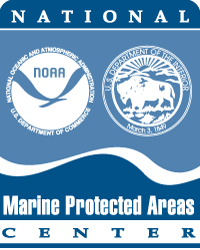Risk Evaluation Case Study - Underwater Archeology
A Resource by the Marine Protected Areas Federal Advisory Committee (These statements do not necessarily reflect the positions of NOAA or the U.S. Government)

SCUBA diving carries an inherent risk that cannot be reduced to zero. Whether engaging trained volunteers for opportunistic surveys, paid divers for professional services, or simply promoting shipwrecks for recreational tourism, managers may be "encouraging" inherently risky activity. Site managers must understand the risk and liability issues that pertain to their own sites, for there is no "one-size-fits-all" answer.
Some marine protected areas have examined the recreational promotion issue. Archaeologists for the state of Florida asked their legal counsel to provide an opinion regarding liability if a diver were to be injured while visiting a state Underwater Archaeological Preserve. The State's Attorney determined that shipwrecks in Florida waters already are visited by divers. By interpreting the sites, providing safe diving suggestions, and recommending minimum certification levels, the State's Attorney found that the preserve program made visitation safer, and therefore the state did not assume any additional liability by encouraging visitation to the Archaeological Preserves. The state of Vermont's Attorney General's Office issued a similar opinion. Because the state allowed divers to visit its shipwrecks it already assumed a degree of liability and, assuming conditions were no more hazardous than those normally encountered when diving, additional liability was minimal (Lawrence 2003:66). To date, no reported incidents of diving accidents have been recorded, and no legal action has been brought against government-operated programs. If liability ever is tested in a court case, however, the resulting decision most likely will have ramifications for all submerged cultural attractions.
Unpaid volunteers are different from recreational divers: they are neither tourists nor full employees. Again, site managers must understand the volunteer issues that pertain specifically to their own sites. In Florida, the Florida Public Archaeology Network asks divers participating in their Submerged Sites Education & Archaeological Stewardship (SSEAS) program to fill out a liability release form before engaging in the training course. Similarly, the State of Florida requires all volunteers, whether divers, field crew, or office assistants, to fill out a standard liability release. While these forms cannot prevent legal action being filed, they do provide proof the participant was adequately informed of any risks involved and willingly chose to engage in the specified activity.
Where any individuals are paid to dive (ie employer/employee relationship), the Occupational Safety and Health Administration (OSHA) addresses inherent risk and governs all aspects of the work site, including equipment, air requirements, safety, operational procedures, etc. OSHA diving regulations were implemented in 1978 for the regulation of commercial diving, such as dam construction, offshore oil field diving, and ship husbandry. Since most universities conducted diving for marine science and research and not commercial objectives, in 1984 OSHA issued a "scientific exemption" for specific limited activities, allowing science divers to operate beyond the strict limitations of the construction industry. The exemption required that science diving be governed by a diving safety manual covering operational and emergency procedures, and establishing diver training and certification criteria. Furthermore, a diving control board with the majority of its members being active divers would oversee all science diving operations. Agencies like the American Academy of Underwater Sciences (AAUS) in the United States monitor the status of marine science-based member organizations. Many MPAs manage risk and liability by following the OSHA exemption rules and establishing reciprocity with AAUS-based diving programs. Once again, managers must understand the regulations that pertain specifically to their own sites. Some states have established their own standards and policies.
 Marine Protected Areas
Marine Protected Areas